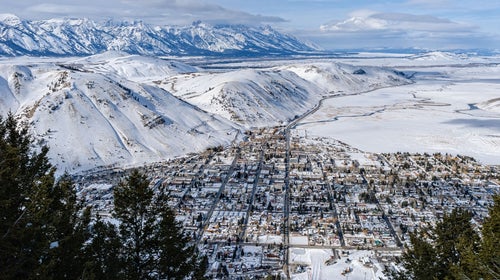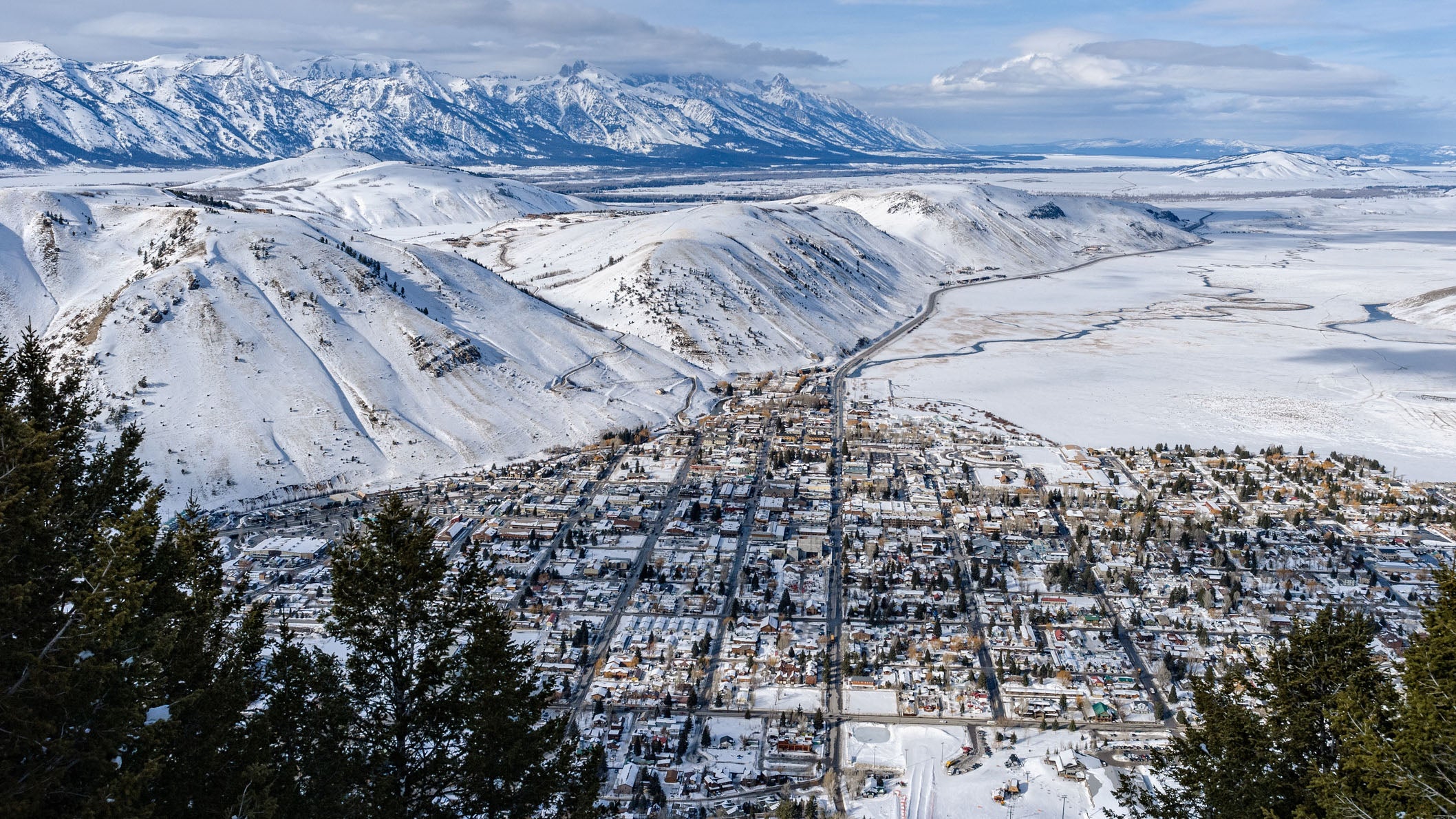If I read too much national news these days, especially about how little our federal government is doing to pass climate legislation, it’s hard to stop myself from feeling nihilistic about our ecological outlook. We’re flailing during the most urgent window for action. But when I zoom in on local politics, I find some reasons for hope. A job posted by the town of Jackson, Wyoming, for example, recently caught my eye.
The opening is for an , a brand-new role that will include managing the local megafauna, planning new public lands, and metering local carbon use. Jackson, which is sandwiched between national parks and national forest, is culturally, economically, and biologically dependent on the health of the local ecosystem. It’s a crucial piece of the area’s identity. The idea is to put someone in place to connect dots between environmental groups and land managers, set a baseline for ecological integrity, and spearhead the community’s climate plan.
Jonathan Schechter, the town council member who developed the idea for the job, said that creating the role seemed crucial to aligning the town’s budget with its stated values. “The first six words of the town’s comprehensive plan are: ‘Preserve and protect the area’s ecosystem,’” he says. “But no one was responsible for that.”
While the ecosystems stewardship administrator role is specific to Jackson’s flora, fauna, and economy, it’s part of a bigger wave of towns that are investing in their sustainability plans by hiring people to directly address local environmental issues, despite stalled-out . Los Angeles recently appointed a city forest officer, who is in charge of increasing the city’s tree canopy by 50 percent, among other responsibilities, and Miami now has a , who will address issues like the rising sea level, which threatens much of the city’s coast.
“So many communities have these very ambitious goals—like to be net zero by 2050—but they’re not putting resources toward it. Where else would you set a goal like that and not fund it? Just imagine if we did that with road paving.”
These roles might sound wonky and boring, but staffing these kinds of jobs and committing resources to sustainability are crucial parts of starting the structural change necessary to keep places like Jackson (or really anywhere) livable. That change obviously needs to come from sweeping policy and serious funding on the national level as well, but it won’t happen without smaller-scale action, like figuring out exactly how to electrify the neighborhood elementary school or monitor and manage the local waterways. We need boots on the ground along with big ideas.
Jillian Wilson-Martin is the director of sustainability in Natick, Massachusetts, a town 20 miles west of Boston. She was one of the first people in the country to take on a civic sustainability role (“I get called the grandma of sustainability staff, which is weird because I have a four-year-old,” she says). Until recently she saw communities come up with ambitious environmental ideas only to fail on execution because of staffing or funding problems. It’s a metaphor for how we’ve dealt with climate change as a society: nice ideas, but not a lot of follow-through.
“So many communities have these very ambitious goals—like to be net zero by 2050—but they’re not putting resources toward it,” Wilson-Martin says. “Where else would you set a goal like that and not fund it? Just imagine if we did that with road paving.”
But in the seven years she’s been on the job, she’s seen the public discourse about addressing the climate crisis change dramatically. In Natick, it’s gone from loose conversation about energy use to community-scale plans for electrification and climate resilience. In Natick, the city government funneled $400,000 from utility incentives and grants to work toward decarbonization, a program that’s now saving $440,000. It’s also preventing river flooding by changing the dams, ameliorating extreme heat days by breaking up with trees, and dealing with point-source water pollution. Wilson-Martin is now seeing other communities in the area band together to share tactics and protect natural resources, like rivers, that cross civic lines.
This new urgency is of course being catalyzed by the fact that we are experiencing climate change during every season. But it also comes from education and community engagement. Wilson-Martin points out that excitement about something like solar panels can spread quickly. “You’re really normalized by what you see happening in your neighborhood,” she says. “The more local the solutions are and the more proof of concept you see next door, the more you feel willing to take a risk.”
The hard part—the piece that a place like Jackson is facing now—is that if solutions are going to be local, the execution has to be specific to the place and to the local power structure. Natick isn’t dealing with an or a massive ski resort, for instance. Towns have to figure out their specific priorities for sustainability, ecosystem stewardship, and wildlife management before they can even start to tackle the problems, and the scope can expand quickly.
“It’s like always trying to be the expert on a million issues because sustainability is so broad-reaching,” Wilson-Martin says. “Like, today I’ve worked on a project related to green infrastructure and stormwater, a regional program for clean heating and solar to help residents decarbonize, composting at the high school cafeteria, and a plan to deal with an aging dam.”
In Jackson, Schechter says the details of the role are deliberately wide-ranging right now because part of the job will be figuring out what the community’s needs are and how to balance a growing population with a high-value ecosystem increasingly impinged upon by human use.
“One of the key features of this position is going to be that of an integrator,” Schechter says. “I think a lot about the Greek roots of the word ecosystem: ‘integrating’ the system.”
Jackson has so many positive attributes, he says, from a healthy donor base to uninterrupted open spaces, and he hopes someone can unite these qualities to create an ambitious climate plan, but he knows he’s fighting inertia, capitalism, and a habitual lack of forethought. “If we can do it, other places can learn from us,” he says. “If we can’t do it, with all these resources, it makes me very worried. We have the awareness, we know this is an opportunity, and we know how this story ends if we don’t try to alter it.”
Wilson-Martin says she’s motivated both because there’s so much opportunity for change and because the consequences of inaction are so serious. “We live in these awesome and scary times,” she says. “We’re going to be part of this generation that’s changing. That’s uncomfortable, because sometimes the solutions aren’t there yet or the solution might not work for everyone, but we’re all going to be going through this crazy transition, and we need people to make it happen.”


